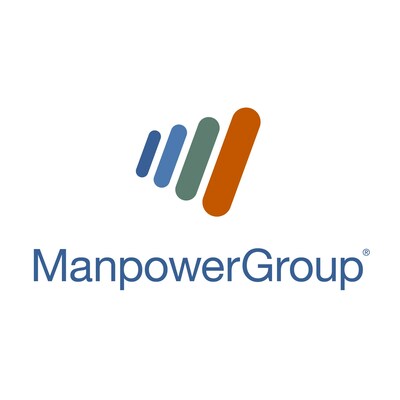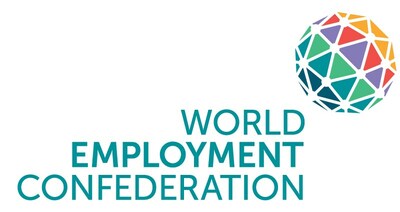Global Study Reveals Business Leaders Expect Advances in AI to Require New Skills
The findings are part of "The Work We Want," a global initiative commissioned by WEC. The first installment of this new international research, "Agile Talent in the Age of AI," details how generative AI will radically reshape workforces, requiring new soft and technical skills to realize the potential technology offers.
"It is clear that advances in AI have the potential to transform the workplace at an unprecedented pace, yet the growing technical and soft skills gap is a critical hurdle businesses must overcome," said Jonas Prising, Chairman & CEO of ManpowerGroup. "While Gen AI will revolutionize many aspects of work, there are elements of jobs that are, and will remain, quintessentially human: collaboration, communication, creative problem solving, and empathy towards others. Organizations must cultivate these uniquely human traits and invest in upskilling and their workforce to succeed in this new digital era."
Key Findings:
80% say it has never been so hard to plan for future talent requirements.92% of senior executives say they'll need a more flexible workforce in the next two years.- Organizations will turn to a wide range of strategies to build flexibility, including setting up sectoral talent pools (
91% ), taking a skills-based approach to hiring (89% ), using online talent platforms (89% ), increase usage of contingent workers (88% ), offering more internal flexibility, e.g. through inter-department secondments/job rotations (88% ), and hiring talent from abroad (88% ). - Employing contingent workers is becoming an increasingly attractive way to access hard-to-find digital skills and higher-caliber candidates with
79% of senior executives saying that employing workers with knowledge of new technology is an effective way to spread understanding to permanent employees.
"The 'Work We Want' is a conversation starter for governments, employers, and workers to address our new work reality and find solutions – collectively – to deliver better labour markets outcomes for all," Denis Pennel, Managing Director of WEC, said. "AI has made agility non-negotiable, and the HR services industry is crucial in helping to fill the labour and skills gaps brought on by digitalization."
Behind "The Work We Want" Initiative
- The project is led by the World Employment Confederation, the global voice of the HR services industry.
- The World Employment Confederation commissioned FT Longitude to conduct a survey in November and December 2023 of 715 senior executives from around the world, including 680 from Forbes Global 2000 companies and 35 public sector organizations.
To learn more about how your organization can bridge the skills gap and thrive in the age of AI, visit https://insights.wecglobal.org/the-work-we-want/home/agile-talent-in-the-age-of-ai to download the full report.
ABOUT MANPOWERGROUP
ManpowerGroup® (NYSE: MAN), the leading global workforce solutions company, helps organizations transform in a fast-changing world of work by sourcing, assessing, developing, and managing the talent that enables them to win. We develop innovative solutions for hundreds of thousands of organizations every year, providing them with skilled talent while finding meaningful, sustainable employment for millions of people across a wide range of industries and skills. Our expert family of brands – Manpower, Experis, and Talent Solutions – creates substantially more value for candidates and clients across more than 70 countries and territories and has done so for more than 75 years. We are recognized consistently for our diversity – as a best place to work for Women, Inclusion, Equality, and Disability, and in 2024 ManpowerGroup was named one of the World's Most Ethical Companies for the 15th time – all confirming our position as the brand of choice for in-demand talent.
For more information, visit www.manpowergroup.com, or follow us on LinkedIn, X (formerly Twitter), Facebook, and Instagram.
ABOUT THE WORLD EMPLOYMENT CONFEDERATION
The World Employment Confederation serves as the voice of the HR services industry at the global level, representing both national federations and workforce solutions companies worldwide. Our diverse membership encompasses a broad spectrum of HR services, including agency work, direct recruitment, career management, Recruitment Process Outsourcing (RPO), and Managed Service Provider (MSP) solutions.
Our mission revolves around securing recognition for the pivotal role played by the HR services industry in fostering well-functioning labour markets and advocating on behalf of our members to enable appropriate regulation. By fostering an environment conducive to sustainable growth of the HR services sector, our ultimate goal is to deliver better labour market outcomes for all.
By bridging the supply and demand gaps in labour markets, creating pathways to employment, enabling agile organisations, balancing flexibility with protection and deploying digital solutions responsibly, the HR services industry plays a central role in addressing labour market challenges and delivering people-centric solutions.
![]() View original content to download multimedia:https://www.prnewswire.com/news-releases/global-study-reveals-business-leaders-expect-advances-in-ai-to-require-new-skills-302107682.html
View original content to download multimedia:https://www.prnewswire.com/news-releases/global-study-reveals-business-leaders-expect-advances-in-ai-to-require-new-skills-302107682.html
SOURCE ManpowerGroup









